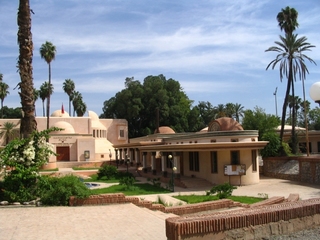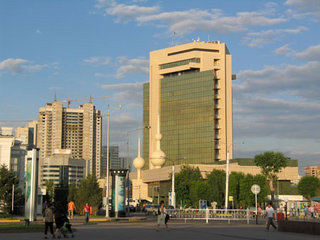The central bank governor is warning that the euro is not the cure for all Poland's ills
Published:
19 January 2005 y., Wednesday
The central bank governor Leszek Balcerowicz is warning that the euro is not the cure for all Poland's ills.
Leszek Balcerowicz believes the government should focus on reforms to yield long-term economic growth, rather than rushing to join the single currency.
"I never said that Poland should enter [the eurozone] at any cost. I said the best strategy is to fulfill conditions for euro entry in a rapid and sustained way," said Balcerowicz, while attending a meeting of central bank governors last week. "The process of EU enlargement was conducive to reforms. The idea of euro entry should be a similar incentive."
Balcerowicz has frequently said that eurozone entry is a political, rather than an economic issue, and that taxes and spending are currently too high for single-currency membership. He also said that tougher reforms were necessary to free Poland from the shackles of long-term high unemployment. In the 1990s, his economic treatments helped Poland recover from the collapse of communism.
"It will pay for Poland to undergo fiscal consolidation," he said. "Unemployment in Poland is not due to over-excessive market-oriented reforms. All of the reasons are structural. There has been some labor market liberalization but I think we need much more decisive action."
Despite his comments, the Civic Platform (PO) party, which is expected to win the next general election, says eurozone entry by 2009 will be a key objective for the party. "Our government will have the strategic goal of adopting the euro by 2008 or 2009. We will do everything to make sure it happens," said Zbigniew Chlebowski, deputy head of the Platform's parliamentary group.
Chlebowski also hinted at the future government's economic policy plans, saying major reform initiatives-such as its flat-tax proposals-would be launched at the start of 2007, not in 2006 as earlier signaled. He also said that limiting the budget deficit in 2006 would be difficult because of the outgoing government's spending promises but that fiscal policy would tighten from 2007.
Šaltinis:
wbj.pl
Copying, publishing, announcing any information from the News.lt portal without written permission of News.lt editorial office is prohibited.
The most popular articles
 On 11 February, heads of state or government of European Union member states will meet in Brussels to seek a commitment towards implementing a revitalised economic strategy to boost employment and growth in the EU.
more »
On 11 February, heads of state or government of European Union member states will meet in Brussels to seek a commitment towards implementing a revitalised economic strategy to boost employment and growth in the EU.
more »
 International Monetary Fund forecasts that Lithuania’s economy will grow 1.6 % this year, making it “the only one of the three Baltic economies expected to be in the positive territory in 2010”.
more »
International Monetary Fund forecasts that Lithuania’s economy will grow 1.6 % this year, making it “the only one of the three Baltic economies expected to be in the positive territory in 2010”.
more »
 Raynair announced it would open its 40th and 1st Central European base at Kaunas, Lithuania’s second largest city, in May with 2 based aircraft and 18 routes.
more »
Raynair announced it would open its 40th and 1st Central European base at Kaunas, Lithuania’s second largest city, in May with 2 based aircraft and 18 routes.
more »
 A new Partnership Strategy for Morocco has been approved by the Board of Executive Directors of the World Bank.
more »
A new Partnership Strategy for Morocco has been approved by the Board of Executive Directors of the World Bank.
more »
 The electric car is an opportunity for European industry.
more »
The electric car is an opportunity for European industry.
more »
 The EBRD’s Board of Directors has adopted a new strategy for Kazakhstan, which reinforces the Bank’s commitment to further support the Kazakh economy and sets out the priorities for its activities in the country over the next three years.
more »
The EBRD’s Board of Directors has adopted a new strategy for Kazakhstan, which reinforces the Bank’s commitment to further support the Kazakh economy and sets out the priorities for its activities in the country over the next three years.
more »
 The European Commission has authorised, under EU state aid rules, plans notified by Sweden to provide a guarantee that would enable Saab Automobile AB to access a loan from the European Investment Bank (EIB).
more »
The European Commission has authorised, under EU state aid rules, plans notified by Sweden to provide a guarantee that would enable Saab Automobile AB to access a loan from the European Investment Bank (EIB).
more »
 At the informal meeting of the Ministers of Competitiveness (Science and Industry), to be held between 7 and 9 February in San Sebastian, the issues on the table will include placing science at the top of the EU agenda and showcasing its role in economic recovery, as well taking the debate on the electric vehicle to EU level.
more »
At the informal meeting of the Ministers of Competitiveness (Science and Industry), to be held between 7 and 9 February in San Sebastian, the issues on the table will include placing science at the top of the EU agenda and showcasing its role in economic recovery, as well taking the debate on the electric vehicle to EU level.
more »
 The Executive Board of the International Monetary Fund (IMF) today approved a 27-month Stand-By Arrangement with Jamaica in the amount of SDR 820.5 million (about US$1.27 billion) to support the country’s economic reforms and help it cope with the consequences of the global downturn.
more »
The Executive Board of the International Monetary Fund (IMF) today approved a 27-month Stand-By Arrangement with Jamaica in the amount of SDR 820.5 million (about US$1.27 billion) to support the country’s economic reforms and help it cope with the consequences of the global downturn.
more »
 Mr. Nadeem Ilahi, chief of an International Monetary Fund (IMF) staff mission to the Kyrgyz Republic, issued the following statement today in Bishkek.
more »
Mr. Nadeem Ilahi, chief of an International Monetary Fund (IMF) staff mission to the Kyrgyz Republic, issued the following statement today in Bishkek.
more »